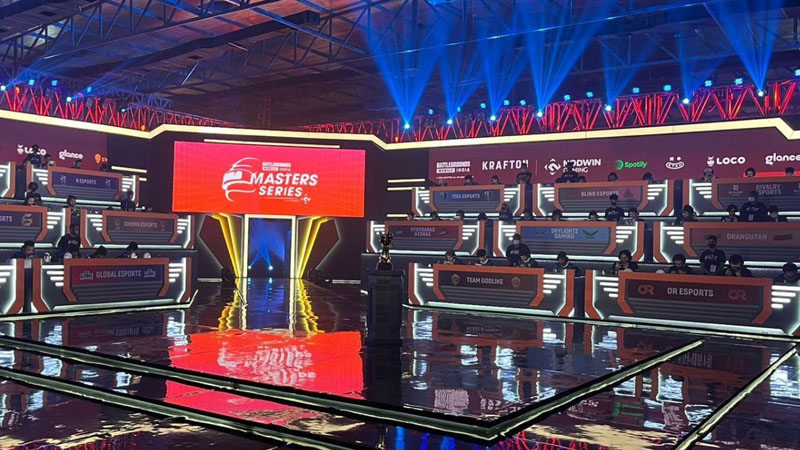India has been the talking point for many years concerning the gaming industry. From general stigma about video games, to esports not being seen as a viable career path, the India market has plenty of demons to battle in growing this industry.
Esports may change all of this, with recent awareness and infrastructure improvements gave better scope for many organizations. Currently, the most played game within the country (esports wise) is Valorant after the recent BGMI ban. Mobile gaming is seeing the likes of Pokemon and Warzone get into the frame as well. While the country as a whole has been on quite iffy about online gaming, the stigma of it has greatly reduced. Let’s explore the various reasons why India is not already an esports powerhouse.
BGMI Masters Series broke traditional sports viewership records in India
Stigma of Online Gaming and Esports in India
Gaming stigma is the one major contributing factor to the situation at hand. Not in a professional manner but more about the social status of gamers and games. Currently, the most famous people in India are either Cricket Players or Bollywood Actresses/Actors.
Since childhood, it is a dream for many to be able to work in sports like Cricket and Football. But the work needed in getting there has been quite the uphill battle. Due to this part of the sport being hidden, many put the grind and effort into the domain but don’t make it professional. On the other hand, esports has a low barrier of entry, but isn’t seen in the eyes of many as a sport and instead a way to waste time.
Gaming in general is looked down upon, and esports even as a term create pause in majority of the population. Many believe this could be due to a lack of exposure of anything gaming and esports related in Indian media and television.
Serious lack of infrastructure and regulations
With India being one of the biggest economies in the world, it would seem that the work-life would be easy. In reality, there are a lot of infrastructures that are yet to build up all around the nation.
While everyone will agree that the IT sector within the nation is booming. The scale and level of growth is no-where near and quality enough to support gaming and esports. Power shortages, dodgy networks and sub par hardware are the modus operandi still, and it will take a long time before the basic ingredients for real gaming to make a big entrance in India’s rural areas.
Having a constant source of internet in the eyes of an average person in India would be a privilege. Many people try to finish all of their work and assignments as well as play tournaments in cafes that will have wifi in them. Due to the 4G infrastructure being to an extent manageable, some have the mobility to play a game of BGMI while on the bus or in a park. There are points within the major cities where one might not even be able to use speeds of over 10Mbps on their mobile data. As such this has held to a major handicap concerning the network infrastructure. The other major factor is that building a PC for gaming within India is quite expensive. This is majorly due to the amount of taxes one needs to pay concerning mobiles as well as hardware.
Authorities simply don’t care about games or esports
Gaming as a whole within the nation has been a topic of a lot of debate among the authorities within the nation. Not for the right reasons though.
Due to there being a sudden spike of free internet available within the nation following the launch of JIO. There was quite a trend for many players to start playing PUBG. This in turn led there to major news coverage on people being addicted to the game. As a result, the first few years of PUBG within India had been quite rough. First, an NGO approached the governing bodies to ban the game, and the game was banned for a while. Additionally, PUBG and similar games having their servers within China, gave a whole new dimension of games becoming unwelcome. Mobile games suddenly became unwelcome for cheap political points.
Another aspect is about the amount of taxes one needs to pay. Currently, games are divided into two categories, games of skill and games of luck. Games of Luck will consist of games while majorly dealing with gambling. As such recently the taxes for both were increased to 28%. While esports comes under games of skill, it previously was taxed at 12%, but there are hints of a tax spike in this segment as well. This spike in the amount of taxes gaming organizations and apps need to pay has resulted in very few companies even thinking to invest in the nation. Games like Valorant and Pokemon Unite have taken the leap of faith by installing servers within the nation while planning to host events and tournaments.
Indian esports may be on the up and up
Global Esports has become the first Indian organization that has a franchising spot within the Valorant VCT ecosystem. The organization is suddenly a brand ambassador for esports in India, and the burden falls on them to promote the success of esports careers. If this tie-in does become successful, we could see a slow shift in mentality towards esports as a viable career path. With it, more teams from India may get a shot at attracting both sponsorships and acceptance.
Plenty of culture in the country is influenced by success coming from abroad, as Indian teams gaining renown internationally will definitely make the news cycle.
